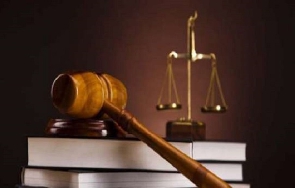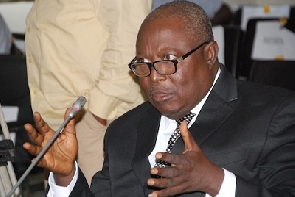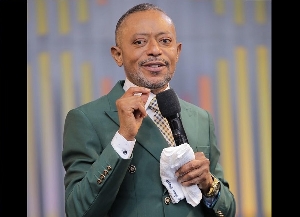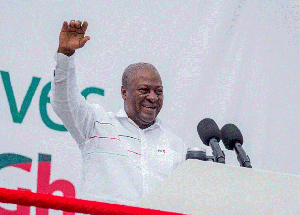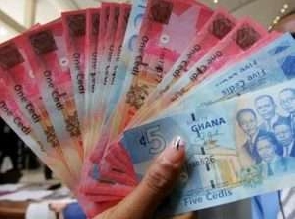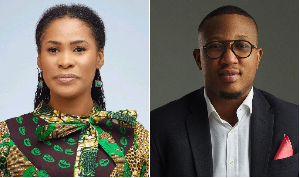On the mere earth of our country Ghana, on the unremarkable streets of Accra, treads a real ‘Superman’, according to the self-acclaimed ‘Superman’.
His name is Martin A. B. K. Amidu, and according to him, he would not be remonstrated with, not be spoken to, not to be dissuaded and untargeted, when he sets his baleful eyes on bringing you down. Indeed, not even the President of Ghana, the man who gave him the opportunity to serve, has the right, or even the duty, to dare to wish off him, or call on him, Martin Amidu, to do the proper thing. It does not matter that the man asking is the President of Ghana. It does not matter that the man asking is the man who demonstrated the monumental act of faith of appointing an opposition member, a former Vice Presidential Candidate of the leading opposition party, as the Special Prosecutor. And it, of course, did not matter that what was being asked of him, Mr Amidu, was the rightful thing, that he listens to the other side, as Mr Amidu’s legal training teaches him to do.
Even the guiltiest on earth, those who have raped, maimed and murdered, deserve their day in court. They also deserve the right to be heard.
But not to Mr Amidu. Once he decides that you are guilty, you are. He will write all that he believes to be true on official paper paid for by the government, and post it to wherever he believes to be right. Even if there is no balance.
In Ghana, as in all Common Law countries, two basic principles continue to ring true over the centuries, the principles of Aldi alteram patem, translated as ‘hear the other side’, and nemo iudex in causa sua, translated as ‘do not be a judge in your own cause’.
According to Martin Amidu, he flagrantly abused these two basic judicial concepts.
In reaction to similar conduct as Ex-President John Mahama, the latter called Mr Amidu a coward. John Mahama was right, in spades!
Again, as a former Prosecutor, a former Deputy Attorney-General who was often called upon to serve as Attorney-General and was once a substantive Attorney-General, Mr Amidu knows or ought to know that even in criminal matters, a prosecutor has a duty and an obligation to review all evidence that comes before him. It is a duty, and not just a responsibility.
It is therefore cowardly of Mr Amidu, and unsuitable of him, given his long history as an anti-corruption campaigner, and history as a primary law enforcement officer, to refuse to receive evidence from a target of investigation when it is offered to you.
It is not dutiful, and it is irresponsible.
Even if Mr Amidu had already interviewed Mr Ofori Atta, he still had a duty and responsibility, once the man was offering further evidence and testimony, to receive it and review it. Every constable at every police station knows this. That is what every responsible and dutiful law enforcement officer would do. After all, what can go wrong? It is either Mr Ofori Atta would offer adequate justification, and therefore reasonable excuse for conduct relative to the Agyapa Case, which, if Mr Amidu has no axe to grind, is all well and good.
Or the statement sought to be given to Mr Amidu by the President would further implicate Mr Ofori Atta, which would strengthen Amidu’s hand, which would be a plus for the fight against corruption in Ghana, and another feather in the cup of Mr Amidu.
Or, yet again, the statement sought to be given to Mr Amidu would be of no use, which would then again strengthen Mr Amidu’s hand.
To refuse to accept what was being proffered by the President was therefore irresponsible and unprofessional and not conduct that speaks well of an anti-corruption campaigner. In fact, it would not speak well of the least police constable in Ghana.
In any case, did Mr Amidu speak to Mr Ofori Atta throughout this investigation?
If he did not, then the whole so-called investigation is just so much hogwash. In fact, if Mr Amidu spent any public funds on that wild goose chase, he ought to be invited and charged with causing financial loss to the state.
Indeed if he did not invite Mr Ofori Atta, then he was just playing to the political gallery, with a deadly serious national matter!
Then I come to the issue of ‘Courtesy 101’, otherwise known as ‘How to Be Human 101’. Human beings, when they meet people who offered them a job from which job they made a little living, have a duty to demonstrate a little courtesy to such people. If such people offer one documentation (not money, not a bribe, not an attempt to bribe or influence), one accepts such documentation, at least for the sake of politeness.
However, where the documents are germane, relevant and probative of an ongoing investigation, then one even has a duty to go looking for such documents.
Mr Amidu, I am afraid, has not been fair to all of us. But the person he has been most unfair to, in all this, is himself. After a long and distinguished career, he is truly going home with a big black mark!
(Below, is the publication to which the above right-up is in reaction to).
Akufo-Addo handed me a copy of Ofori-Atta's comments to infuse into the Agyapa report but I refused - Amidu.
In his resignation letter to President Nana Addo Dankwa Akufo-Addo, former Special Prosecutor Martin Amidu, directly told the Commander-in-Chief of the Ghana Armed Forces that he could not direct him about as far as his handling of the corruption and anti-corruption assessment report of the controversial Agyapa Royalties deal was concerned, and refused to “bargain” with the President, who insisted the anti-corruption crusader infuse Finance Minister Ken Ofori-Atta’s comment about the deal, to his (SP’s) final report.
Mr Amidu, in his corruption and anti-corruption risk assessment report on the deal, said the Transaction Advisor(s) involved were susceptible to “nepotism, cronyism and favouritism”.
In his resignation letter to the President dated Monday, 16 November 2020, however, Mr Amidu accused Nana Akufo-Addo of interfering with the independence of the Office of the Special Prosecutor with regard to the corruption and anti-corruption assessment, thus, found it “untenable” to remain in office.
He said the President on several occasions, pestered him to either freeze the report or add some comments of his cousin, Mr Ofori-Atta, into the final assessment report.
He said: “After receiving my letter under reference on 19 October 2020, you ordered your Chief of Staff on 20 October 2020, to deliver an urgent message personally to me on the same day”.
“When she could not reach me on the telephone, she decided to invite me in writing in her letter with reference number OP/COS/015 dated 20th October 2020, stating that: ‘I have been directed by HE the President of the Republic, to deliver an urgent message personally to you, today, 20 October 2020. I am looking forward to seeing you as requested’.
“I received the Chief of Staff’s letter the next morning, 21 October 2020, and reported to her office as requested. The message she delivered to me was that: You had instructed that I was not to do anything about my report on the Agyapa Royalties Transaction until I had met you on Friday, 23 October 2020.
“You were away in the Volta Region when I met the Chief of Staff.
“I met Your Excellency in your office in the afternoon of 23 October 2020 and I underscored the fact that my letter dated 16 October 2020 to you was sent out of the necessary courtesy of prior information to your office as President of the Republic and the Commander-in-Chief responsible for national security.
“I also underscored the fact that the analysis of the risk of corruption and anti-corruption assessment, was conducted professionally, and could not be reviewed by the Minister of Finance or yourself, and my letter was particularly not intended for you to direct me as to how to conduct the duties of my office.
“Your Excellency insisted that I should withhold any further action on the report for one week. I reluctantly agreed to your terms but gave you notice immediately that I did not intend to continue as the Special Prosecutor because of your interference with the performance of my functions under the law.
“You eventually invited me to your office in the evening of Sunday, 1 November 2020, where I, again, asserted that I was not going to bargain over the independence of my function as the Special Prosecutor.
“I refused to take the copy of the alleged comments from the Minister of Finance you offered me, as that would have compromised my independence as the Special Prosecutor.
“I also refused to shelve my report to enable you to handle the matter, which explains my press release to the public on the morning of 2 November 2020 and the follow-up with the distribution of the full 64-page Agyapa Royalties Transactions Anti-corruption Assessment Report to the Public.”
“Unbeknownst to you that I had published the full 64-page report to the public, you caused a press statement to be made based on my letter dated 16 October 2020 to you under reference which sought to politicise and downplay the seriousness of the professional analysis of the risk of corruption and anti-corruption assessment reported by my office”.
“It thus became abundantly clear to me that I cannot continue under your government as the special prosecutor because we disagree with the non-partisan independence of the special prosecutor in the performance of the functions of my office in preventing and fighting corruption and corruption-related offences.”
According to Mr Amidu, “the 64-page analysis of corruption and anti-corruption assessment report, discloses several serious corruption and corruption-related offences in respect of which I intended to open full investigations as the Special Prosecutor.”
“I cannot do that now after your political interference in the performance of functions of the office for two weeks – from 20 October 2020 to 1 November 2020 – culminating in your directives on how the anti-corruption assessment report of Agyapa Royalties Limited Transaction by this office should be handled by the principal suspects disclosed by the anti-corruption assessment report”.
He added: “More importantly, Your Excellency was acting as a judge in your own court in usurping my functions to take any independent follow-up actions on the anti-corruption assessment report when you knew from my 13-page letter of 16 October 2020, conveying the conclusions and observations of the anti-corruption assessment report to you that negative anti-corruption assessment had been made against the conduct of your office in the procedure adopted in granting the Executive Approval dated 24 March 2020 and your assent of the Minerals Income Investment (Amendment) Act, 2020 (Act 1024) on 27 August 2020 intended to retroactively impact the parliamentary approval of the transactions document granted on 14 August 2020.
“Pages 31 to 33; and 52 to 53 of the full 64-page report, submitted to you on 2 November 2020, contains the detailed anti-corruption assessments on these matters. The total of the foregoing interventions by you in my functions, make my position as the Special Prosecutor, untenable”.
Click to view details



Opinions of Thursday, 19 November 2020
Columnist: Kenneth Kuranchie Agyei
Martin Amidu’s 'cowardly' confessions
Opinions
